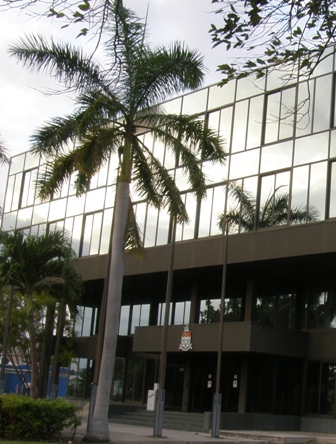Archive for October 22nd, 2009

Man arrested following George Town burglary
(CNS): Police said that a 33-year-old man was arrested last night on suspicion of burglary following a break in at a home on Outpost Street, George Town. The female victim returned home to find a man in her bedroom at around 11pm, but upon seeing the burglar she quickly ran to her car and called 911. Police responded to the call and were able to arrest the offender.
Anyone with information of crime taking place can pass it on to police in a number of ways; people can speak with an officer they know and trust, they can reach George Town detectives on 949-4222, they can leave information on an anonymous voicemail service by calling 949-7777 or they can call Crime Stoppers on 800-8477 (TIPS). All persons calling Crime Stoppers remain anonymous, and are eligible for a reward of up to $1000, should their information lead to an arrest or recovery of property/drugs.

CAL boosts Honduras route
 (CNS): Starting next week, Cayman Airways Limited (CAL) is increasing service to La Ceiba, Honduras with two nonstop Boeing 737 jet flights a week. Acting CEO Fabian Whorms says the company is looking forward to serving this Caribbean coastal town in the long term. “Honduras and Cayman have long been linked by the settlement of their people in each other’s communities, so we are very pleased to be able to provide greater frequency of non-stop jet flights between our homelands,” he said.
(CNS): Starting next week, Cayman Airways Limited (CAL) is increasing service to La Ceiba, Honduras with two nonstop Boeing 737 jet flights a week. Acting CEO Fabian Whorms says the company is looking forward to serving this Caribbean coastal town in the long term. “Honduras and Cayman have long been linked by the settlement of their people in each other’s communities, so we are very pleased to be able to provide greater frequency of non-stop jet flights between our homelands,” he said.
Starting 29 October, the new twice-weekly non-stop jet service from Grand Cayman to La Ceiba will operate on Thursdays and Mondays. Flight KX 824 departing Grand Cayman at 1pm and arriving in La Ceiba at 1:20pm. The return flight KX 825 departs La Ceiba at 2:20pm, arriving on Grand Cayman at 4:40pm. There is a one-hour time difference between the two gateways.
To celebrate the launch of this extended service, roundtrip airfares between Grand Cayman and La Ceiba start from US$220 (CI$184.80), not including taxes and fees. Travel must be completed by 7 December, 2009 with this fare. Also for a limited time, Cayman Airways customers travelling to La Ceiba can take advantage of the airline’s current “Three Bags Free” offer and 50% bonus air miles now through 31 October. Some conditions apply on all offers and sale fares.
To book online visit www.caymanairways.com or call Cayman Airways reservations on 345-949-2311, or your local travel agent.

Armed officers in UK placed on routine foot patrol
 (The Telegraph): Police officers armed with submachine guns are to be deployed on routine patrol of Britain’s streets for the first time. A hand-picked team from CO19, the Metropolitan Police’s elite firearms unit, will walk the beat in gun crime hotspots where armed gangs have turned entire estates into "no go" zones. The officers will carry Heckler & Koch MP5 submachine guns – capable of firing up to 800 rounds-per-minute – and Glock semi-automatic pistols. CO19 currently provides armed support in volatile situations like sieges and terrorist attacks, with its officers on constant call in vehicles around London.
(The Telegraph): Police officers armed with submachine guns are to be deployed on routine patrol of Britain’s streets for the first time. A hand-picked team from CO19, the Metropolitan Police’s elite firearms unit, will walk the beat in gun crime hotspots where armed gangs have turned entire estates into "no go" zones. The officers will carry Heckler & Koch MP5 submachine guns – capable of firing up to 800 rounds-per-minute – and Glock semi-automatic pistols. CO19 currently provides armed support in volatile situations like sieges and terrorist attacks, with its officers on constant call in vehicles around London.

Caymanians still dominate in civil service.
 (CNS): On the 30 June this year there were 3,756 core government civil servants — four percent down on last year, and over 70% of them are Caymanian. From a low of 56.7% in 2001 the percentage of Caymanian employees working directly for government grew steadily until it reached a high of over 75% in 2005, since then the percentage of locals working for government has hovered around the 70%. According to an employment report from the portfolio of the civil service there are thirteen government departments with over 90% Caymanian employees and three can claim a 100% local staff.
(CNS): On the 30 June this year there were 3,756 core government civil servants — four percent down on last year, and over 70% of them are Caymanian. From a low of 56.7% in 2001 the percentage of Caymanian employees working directly for government grew steadily until it reached a high of over 75% in 2005, since then the percentage of locals working for government has hovered around the 70%. According to an employment report from the portfolio of the civil service there are thirteen government departments with over 90% Caymanian employees and three can claim a 100% local staff.
However, the service is still something of a melting pot as the report reveals that scattered across various departments are 1105 people from 38 different countries. While Jamaicans and Brits make up half of the foreign nationals there are people employed by government from as far afield as Romania and Nigeria. Not surprisingly the governor’s office has the highest percentage of non-Caymanian workers followed by the Audit office and 911 where three-quarters of the staff are from overseas. However, the immigration department; customs; recreation, parks & cemeteries, fire department and most of the ministries have a full complement of Caymanians. Half of the foreign workers in the civil service were recruited on island.
Although Caymanians are over represented in the lower wage brackets they still also dominate in the higher grades as well. Foreign nationals tend to be numerous in technical and specialist rolls where there are less Caymanians available. The report suggests that the higher than average percentage of local staff in the lower grades and wage brackets is as a result of the number of junior posts that are filled by Caymanians.
Although there are more women than men in the service, when it comes to salaries the report reveals that the higher grades are dominated by men. There are more men than women in all grades from A-H. At the lower end of the pay scale, among wage earners again men dominated the highest wage brackets and women the lowest.
When it comes to age-friendly departments, the post office has the highest number of workers over 70 with 5 people well past retirement age still employed. District Admin also employs four septuagenarians and conversely employs the most workers under the age of 20. Both the MRCU and the National Archive however, have the highest percentage of workers over retirement age with 18%. Over at the general registry and department of youth and sports however the staff is dominated by the under 30s.
Staff turn over in the service is just above 12% for 2008/09, for the last five years turnover has been around 11%. Although the Department of Tourism had a turnover of 40% authors of the report indicated this owed much to the policy of employing scholarship students on short term job placements. 911, the cadet core and the empowerment and community development agency have all had high turnover rates during 2008/09. Aside from the governor’s office the OCC, vehicle & equipment services, youth & sports, the health regulatory board and the Legislative Assembly all had 0% turnover during 2008/09. Other departments with low turnovers included lands & survey, customs and the economics & statistics office.
Only three percent of both Caymanians and non-Caymanians who left were sacked and 42% of foreign workers, versus only 27% of Caymanians resigned.

Cayman to open first specialist financial court
 (Hedge Funds Review): The Cayman Islands will open a dedicated financial services division of Grand Court next month to adjudicate complex litigation involving financial companies, including those linked to hedge funds domiciled in Cayman. The court will hear cases involving investment funds, insurers and other financial services providers based in the Cayman Islands. This will include regulatory proceedings, insolvency cases and disputes on breach of contract, breach of trust and breach of fiduciary duty, including claims brought against service providers to investment funds.
(Hedge Funds Review): The Cayman Islands will open a dedicated financial services division of Grand Court next month to adjudicate complex litigation involving financial companies, including those linked to hedge funds domiciled in Cayman. The court will hear cases involving investment funds, insurers and other financial services providers based in the Cayman Islands. This will include regulatory proceedings, insolvency cases and disputes on breach of contract, breach of trust and breach of fiduciary duty, including claims brought against service providers to investment funds.
Mac sets out legal aid woes
(CNS): As a result of a catalogue of problems surrounding the current legal aid system, the leader of government business said today that the state has a duty to step in and deal with those problems. No audits, lawyers being overpaid, no control of costs in cases, a perception of bias and awards to people who don’t need it were some of the problems he said were plaguing the current system. McKeeva Bush said government was obliged to determine whether the current situation was in the best interest of the country, and because of the shortcomings, government had decided to change the policy to pave the way for a legal aid office.
Following the LoGB’s first announcement regarding a legal aid office as Finance Committee was drawing to a close late last Monday evening (12 October), a number of questions about how it will work have been raised. Speaking in the Legislative Assembly on Wednesday morning, Bush noted the benefits that he expected from what he described as the McField-Pitcairn plan. But he bemoaned the criticisms that have been levelled against the idea, which he said were common in Cayman when it came to change.
He said government had concerns over the current situation, not just in terms of the excessive and rising cost of legal aid, but the many shortcomings of the system, which he said justified government’s policy change. Bush stated that he understood that no proper legal aid audits have ever been prepared, which if true was preposterous, he said.
“Such an audit is important as it would set out the information that would enable any relevant body to conduct a proper assessment in light of the complaints levied against the system,” he said.
An audit, he said, would have enabled a review of all legal aid cases and applications that were refused, as well as an independent assessment of the quality of service and the amount spent on criminal and civil matters. It would have provided the names of lawyers and firms who provide legal aid and their level of dependence on the system. Bush also said that. had an audit been done, it would have told government how much was spent on QCs and other visiting counsel along with the number of unpaid accounts and other outstanding matters — hence its importance.
Concerns that some law firms were dependent entirely on legal aid for the existence of their practice had also contributed to the decision, Bush said. “This perception suggests that government sustains these firms and without government funding they would be bankrupt.” He indicated that this not appropriate and noted one lawyer alone had billed government for $146,042 of legal aid work for the 2008/09 year. Bush also stated that the current system of billing allowed lawyers to be paid up to $6,000 while producing $3,000 in value as they are paid by the hour and there was no maximum cost placed on a legal aid cases.
Problems in enforcing contributions from legal applicants, measuring their real need and eligibility were also noted, as well as a suggestion that people believed legal aid was being given to those who do not need it. Bush also raised concerns about how decisions were made over who receives the benefit and who does not. “There is a perception of bias as legal aid is currently granted by the judges,” the LoGB added.
Bush told the House that the new office would offer legal aid to a far broader cross section of the community for more things, subject to their ability to pay and certain maximum expenditures. Costs would be kept down, he said, as lawyers will be salaried instead of being paid by the hour or appearance. Pre-trial advice would be available, better access to lawyers, perceptions of favouritism by judges would be removed, family law matters would be mediated before getting to court, and funding would be spread where it was needed most, the LoGB promised.
He claimed the office would cap spending but still offer access to legal advice and support. “Legal aid recipients will be treated more like clients rather than wards of the state,” Bush said, adding that the office would change the perception that legal aid was only for those who had committed heinous crimes, but that it would offer access to legal support for everyone who needs it but cannot pay.
Lauding it as a panacea for almost all of the legal aid ills, he said the new office would also provide a training ground for Caymanian lawyers of the future.
The LoGB said that the $300,000 left with the CJ should be enough to cover the transition period as the office would be opened by the end of the year. Despite the criticisms, Bush said the McField-Pitcairn plan would reduce the spiralling and runaway legal aid costs to the government and was not only timely but prudent and well thought out. Criticising what had gone before, he said this new office would solve the problems that had long been mounting but that no one else from the legal fraternity had been prepared to address.
“The plan is designed to meet the needs of a broader area of the poor and needy and removes the perception that there is no transparency and accountability in the way legal aid is dispensed,” Bush stated. “The plan will end the historical regime of open ended legal aid funding, capping the amount of legal funds, making the delivery of legal aid services independent of the courts and dependent on a structured Legal Services Office rendering high quality legal aid service to the many rather than to the few.”